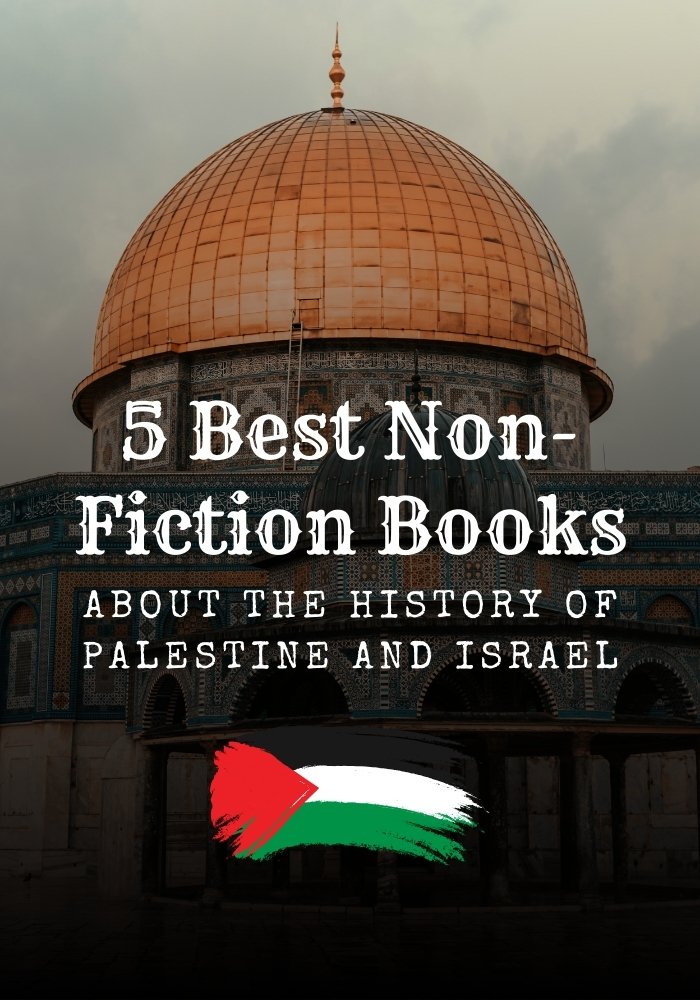Introduction
Exploring the historical conflict between Palestine and Israel unveils a complex series of events marked by deep-seated disputes and aspirations for peace. This overview highlights five essential books that provide clear, factual narratives to enhance your understanding of the region. Each book offers unique insights into the lives of individuals entrenched in these conflicts, giving readers a broad view of the personal and political challenges faced. These works are carefully selected to foster a deeper comprehension and encourage a thoughtful approach to one of the most contentious issues in modern history. By engaging with these texts, you’ll gain a more nuanced perspective of the ongoing struggles and the efforts toward reconciliation. Let’s delve into these books, which are pivotal for anyone looking to grasp the significant yet complex dynamics of the Middle East.
1. The Lemon Tree: An Arab, a Jew, and the Heart of the Middle East by Sandy Tolan
 Sandy Tolan’s “The Lemon Tree” meticulously details the Israeli-Palestinian conflict through the personal histories of an Arab and a Jew linked by a house and its lemon tree. This book offers more than historical facts; it embeds readers into the emotions and lives disrupted by decades-long disputes. For instance, Tolan describes the poignant moment when both families meet under the lemon tree, a vivid scene that captures their shared yet contested bond to the land. The tree itself isn’t just a passive backdrop but a potent symbol of common ground and ongoing division. Through these narratives, Tolan not only narrates but also compels readers to appreciate the persistent human stories within the larger political saga. His approach encourages a deeper reflection on the conflict, urging an understanding that goes beyond conventional headlines to grasp the enduring impacts on daily lives.
Sandy Tolan’s “The Lemon Tree” meticulously details the Israeli-Palestinian conflict through the personal histories of an Arab and a Jew linked by a house and its lemon tree. This book offers more than historical facts; it embeds readers into the emotions and lives disrupted by decades-long disputes. For instance, Tolan describes the poignant moment when both families meet under the lemon tree, a vivid scene that captures their shared yet contested bond to the land. The tree itself isn’t just a passive backdrop but a potent symbol of common ground and ongoing division. Through these narratives, Tolan not only narrates but also compels readers to appreciate the persistent human stories within the larger political saga. His approach encourages a deeper reflection on the conflict, urging an understanding that goes beyond conventional headlines to grasp the enduring impacts on daily lives.
2. My Promised Land: The Triumph and Tragedy of Israel by Ari Shavit

Ari Shavit’s “My Promised Land” scrutinizes Israel’s formation and evolution, presenting a narrative that intertwines celebration and critique. Shavit employs detailed accounts and balanced perspectives to trace Israel’s history from the idealistic visions of its founders to the complex realities faced today. This book provokes thought by delving into ethical dilemmas and the diverse challenges encountered throughout Israel’s history. For example, Shavit discusses the 1948 Lydda expulsion, illustrating the moral complexities and the harsh decisions faced by Israel’s leaders. His narrative style is direct yet engaging, making complex historical events and ideas approachable and relatable for readers. “My Promised Land” offers an introspective look at the formation of Israeli identity and the enduring impact of its historical trajectory, inviting readers to reflect on the intricate process of nation-building amid ongoing conflicts.
3. Palestine: A Four Thousand Year History by Nur Masalha
 Nur Masalha’s book delves into Palestine’s extensive history, introducing often overlooked events and narratives, such as the influence of the Byzantine period on local culture. He employs archaeological findings and historical documents to assert that Palestine has been a melting pot of cultures, which has shaped its unique identity over millennia. While Masalha effectively highlights the continuity of diverse cultural influences, his narrative sometimes lacks depth in exploring transitional periods, such as the Ottoman Empire’s impact. Furthermore, although he challenges conventional narratives by presenting Palestine’s history as one of multicultural integration rather than conflict, he could strengthen his argument by incorporating a wider array of scholarly views. This would provide a more balanced critique and enrich the book’s contribution to historical discourse.
Nur Masalha’s book delves into Palestine’s extensive history, introducing often overlooked events and narratives, such as the influence of the Byzantine period on local culture. He employs archaeological findings and historical documents to assert that Palestine has been a melting pot of cultures, which has shaped its unique identity over millennia. While Masalha effectively highlights the continuity of diverse cultural influences, his narrative sometimes lacks depth in exploring transitional periods, such as the Ottoman Empire’s impact. Furthermore, although he challenges conventional narratives by presenting Palestine’s history as one of multicultural integration rather than conflict, he could strengthen his argument by incorporating a wider array of scholarly views. This would provide a more balanced critique and enrich the book’s contribution to historical discourse.
4. Six Days of War: June 1967 and the Making of the Modern Middle East by Michael B. Oren
 Michael B. Oren’s “Six Days of War” provides a detailed analysis of the 1967 Arab-Israeli War, focusing on its significant impact on the Middle East. Oren’s account is grounded in diverse sources, including declassified documents and firsthand accounts, which he integrates effectively to offer a multifaceted perspective of the conflict. He carefully examines the strategic decisions and their ramifications, shedding light on both the military triumphs and the subsequent geopolitical shifts. The book encourages readers to consider the complex aftermath of the war, including ongoing diplomatic tensions and peace efforts. However, while Oren strives for a balanced view, further exploration of the Arab political landscape during and after the war would enhance the depth of his analysis. His narrative, though engaging, occasionally borders on the dramatic, which may affect the perceived neutrality of the historical presentation.
Michael B. Oren’s “Six Days of War” provides a detailed analysis of the 1967 Arab-Israeli War, focusing on its significant impact on the Middle East. Oren’s account is grounded in diverse sources, including declassified documents and firsthand accounts, which he integrates effectively to offer a multifaceted perspective of the conflict. He carefully examines the strategic decisions and their ramifications, shedding light on both the military triumphs and the subsequent geopolitical shifts. The book encourages readers to consider the complex aftermath of the war, including ongoing diplomatic tensions and peace efforts. However, while Oren strives for a balanced view, further exploration of the Arab political landscape during and after the war would enhance the depth of his analysis. His narrative, though engaging, occasionally borders on the dramatic, which may affect the perceived neutrality of the historical presentation.
5. The Birth of the Palestinian Refugee Problem, 1947-1949 by Benny Morris

Benny Morris’s groundbreaking work, “The Birth of the Palestinian Refugee Problem, 1947-1949,” dives into one of the most contentious issues in the Israeli-Palestinian conflict. Morris combines authoritative research with a narrative that is both compelling and deeply human, shedding light on the experiences of those who were displaced. This book challenges readers to confront uncomfortable truths, sparking inspiration for personal growth and a deeper understanding of the conflict’s human dimension. Morris’s balanced approach cultivates empathy, inviting readers to see beyond political narratives and connect with the individual stories of loss, resilience, and the unfulfilled longing for home.
Conclusion
These five books offer a mosaic of perspectives that together provide a rich and multifaceted understanding of the Palestine-Israel conflict. Each work, with its unique lens, contributes to a broader comprehension of the history, challenges, and human stories that define this enduring issue. From the poignant personal narratives in “The Lemon Tree” to the comprehensive historical analysis in “Palestine: A Four Thousand Year History,” readers are invited to traverse time and perspective, gaining insights that are both intellectually stimulating and emotionally resonant.
The emotional depth and cultural sensitivity these books offer can significantly alter perceptions of the Palestine-Israel saga. By engaging with these narratives, readers are not merely absorbing facts, they are being invited into a space of empathy, reflection, and, hopefully, understanding. The vivid imagery and personal stories contained within these pages serve to humanize a conflict that, for many, has been reduced to headlines and political rhetoric.
Moreover, these books collectively underscore the complexity of the conflict, challenging readers to grapple with the nuanced realities of both triumph and tragedy. They encourage a move beyond simplistic narratives, fostering a deeper, more nuanced understanding of what it means to call this land home. The authority and confidence with which these authors write lend their accounts a credibility that can inspire readers towards greater awareness and action.
The anticipation and suspense built into these narratives ensure that the journey through the pages is as engaging as it is enlightening. Readers are not just learning about history, they are being taken on a journey through it, with all the twists and turns that the story of Palestine and Israel inherently holds.
Ultimately, these five books possess the power to change perspectives on the Palestine-Israel issues. They offer more than just historical accounts, they provide pathways to empathy, understanding, and perhaps even solutions. For anyone looking to comprehend the depth of this conflict, these books are not merely recommendations, they are essential reading. Through the lens of history, memoir, and analytical research, they illuminate the complexities, the people, and the land that continue to captivate the world’s attention.
In the end, the journey through these books is a personal one. Each reader will come away with their own insights, emotions, and questions. Yet, the shared experience of engaging with these texts can foster a collective understanding and empathy that transcends borders and conflicts. If peace is ever to be more than a fleeting dream in the Middle East, it will begin with understanding, and understanding begins with stories like these.






